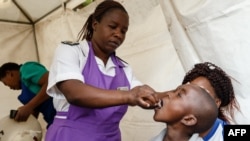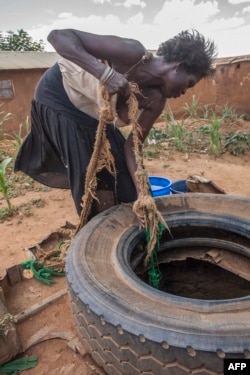Plans are underway in Malawi to start administering the cholera vaccine in some southern districts, as the number of cholera cases has been rising since an outbreak began in January.
According to a daily update released Thursday by the Ministry of Health, Malawi has registered more than 200 cases, with seven deaths and 26 hospital admissions.
The update says the outbreak that started in Nsanje district in January has spread to four other areas in southern Malawi: Neno, Chikwawa, Machinga and Blantyre.
Records show that as of Thursday, Nsanje had 97 registered cases, Blantyre had 53, Neno had 38, Chikwawa had 12 and Machinga had two.
Wongani Mbale, deputy spokesperson for the district health office in Blantyre, blames the outbreak on poor sanitation.
"According to what we have gathered, it seems that a lot of people are using unprotected wells, which are a source of infections," Mbale said. "The water is contaminated. So as a district, we think that the cause is the use of contaminated water."
Cholera is an acute diarrheal infection caused by ingesting food or water contaminated with bacteria. The disease affects both children and adults and, if untreated, can kill within hours.
To contain the outbreak, Malawi's government has announced plans to start administering the cholera vaccine this month in all affected districts.
Health Ministry spokesperson Adrian Chikumbe told a local newspaper that the government has 2.9 million doses of vaccine to be administered orally starting May 23.
Mbale of the Blantyre health office said his office has started taking measures to combat the vaccine hesitancy that hindered the rollout of the COVID-19 vaccine.
"Starting from next Monday, we are having some briefings to health workers to train HSAs (Health Surveillance Assistants) on how they can implement this activity," he said. "After that, we will have orientation and sensitization meetings with the community so that they can receive the vaccine without any doubt, as you know that the majority are fearing the vaccine, saying that maybe it's for COVID."
George Jobe, executive director for Malawi Health Equity Network, a health rights organization, said cholera aside, there is a need for the government to address sanitation problems in many rural areas in Malawi.
"In Neno, for example, water has been a challenge. There was a time when [people in] Neno suffered typhoid because of water. And we also understand that the places that have been affected are relying on the Lisungwi River. In this case, there is a need for clean water to be made available even in hard-to-reach rural areas," Jobe said.
The government said it is distributing chlorine in affected areas for water treatment, as well as sending out cholera control information to people through various channels of communication.





